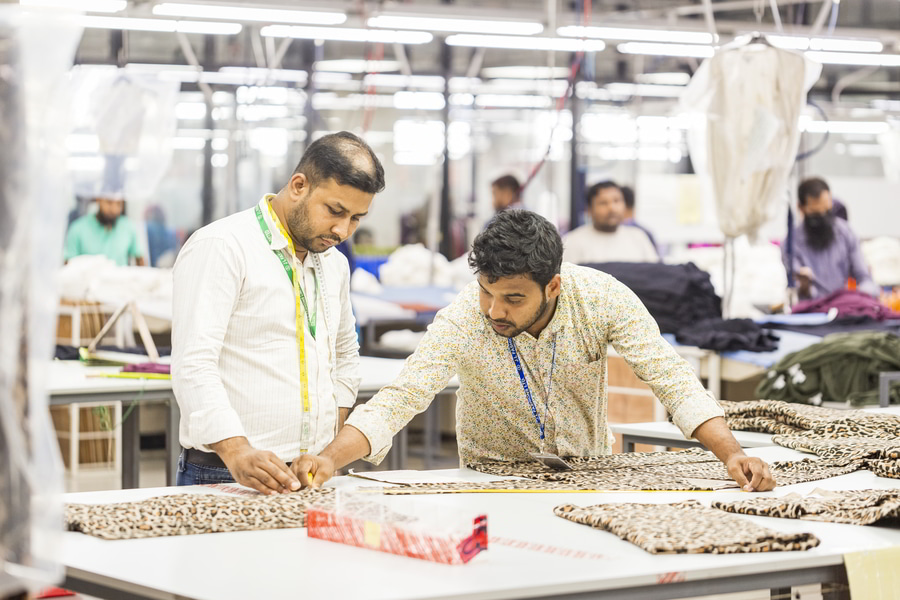A decade of change – a summary of LPP’s 10-year commitment to improving safety and working conditions in the garment industry in Bangladesh

- The Accord, signed in 2013, gave rise to long-term efforts to improve safety in the garment industry in Bangladesh.
- Over the course of 10 years, 53,000 safety audits were carried out and more than 2 million employees received training OHS and labour rights.
- The system of factory inspections and remedial programmes implemented has enabled 1,600 garment factories in Bangladesh to meet high safety standards.
- The Polish company LPP has also taken additional steps by subjecting its suppliers to independent social audits and carrying out an average of 750 of its own checks per year by a specially appointed team.
- In total, LPP has spent more than PLN 40 million over 10 years on improving safety and working conditions in factories.
- The events at Rana Plaza gave rise to a transformation and awareness-building around safe production infrastructure and social issues that continues to this day.
– The disaster at the Rana Plaza complex was a breakthrough moment for the fashion industry and a turning point in working with suppliers. The Accord that was established at that time was a driver for a transformation whereby, over a period of 10 years, we have developed new standards in garment factories in Bangladesh through joint efforts of contracting companies and trade and non-governmental organisations. Today, 80% of the factories covered by Accord are among the best in the country. At LPP, since the beginning of Accord we have only worked with suppliers who agree to the inspections and meet safety conditions, and by 2022 we had allocated a total of PLN 40 million to improve working conditions in factories. Today, we can observe the positive effects of these actions, although we are aware that we cannot stop striving to raise standards throughout the supply chain – says Dorota Jankowska-Tomków, Procurement and ESG director, LPP.
100 % of plants sewing for LPP under Accord’s control
The agreement has resulted in nearly 53,000 audits on working conditions conducted since 2013. Remedial programmes have also been implemented in all factories inspected, resulting in the regular removal of problems detected during the inspections. As a result, currently around 1,600 garment factories in Bangladesh, including all those fulfilling orders for the Polish company LPP, meet high safety standards. Each of the factories fulfilling orders from the Gdansk-based company has also been subject to measures in which electrical installations have been replaced or modernised, the required fire protection has been installed or the buildings’ structures have been strengthened. By 2022, this had made it possible to eliminate 91% of the identified potential risks and implement the required standards for the factories.
One of the major achievements of the Accord in Bangladesh has been the introduction of training for workers on their rights and safety at work. To date, more than 2 million people, nearly half of the industry’s workforce, have undergone a multi-stage training programme under the Safety Committee Training project. 84% of LPP’s supplier factories have been covered.
Multidimensional control of working conditions
The Polish company, LPP, also undertakes initiatives beyond its Accord membership obligations. Starting with the establishment of an audit department at LPP’s headquarters in Gdańsk in 2014, through the preparation of internal structures to carry out independent audits in factories, to the establishment of a representative office in Dhaka in 2015. Currently, over 100 LPP employees in Poland and abroad are involved in the auditing process, carrying out an average of around 750 inspections across the supply chain each year – 77% of which take place in Bangladesh. The inspections concern not only safety rules. They are also social inspections, including such areas as wage policies, freedom of association, the prohibition of child labour, voluntary work or equal treatment of all workers and respect for their rights. Occupational health and safety as well as social issues are also included in the LPP Code of Conduct, which defines the standards of the Polish manufacturer applicable to all partners. In verifying compliance with the Code by suppliers, the company has been supported by international independent auditing companies – SGS since 2018, and QIMA since 2019.
Social conditions closely watched by amfori
By adapting to the social and economic changes taking place and the consequent need to control social issues, LPP in 2022 started working with amfori, an association that provides the company with a better insight into the situation of its suppliers’ employees than before. Amfori examines the employment conditions in the factories based on the amfori BSCI code covering 13 areas such as fair wages, normative working hours or business ethics and environmental protection. In 2022, 90% of factories in Bangladesh fulfilling orders for LPP underwent such an audit. 83% received the highest marks, demonstrating a complete absence of violations in the areas of respecting the prohibition of child labour, freedom of workers’ association and the operation of collective bargain agreements, the absence of forced labour or the provision of a documented and lawful employment relationship, among others.
– The ongoing audits and our discussions with suppliers in Bangladesh show a change in the local garment industry’s approach to employment conditions. What is important is the openness to cooperation on the part of factory owners and the implementation of systemic solutions, which, in our view, are key to achieving change. We realise that there is still a lot of work to be done in the social area, but given the cultural background and legislation, this marks a big step for the entire garment manufacturing sector in this country. 10 years ago, we initiated important changes in a hitherto closed environment. We started by building awareness among suppliers about labour rights and OHS. Today, those who have made the most progress in this regard are leading the change and setting an example for the rest of the industry in the region. We can also observe the rising willingness of our partners to make further changes – from both social and environmental perspective – notes Dorota Jankowska-Tomków, procurement and ESG director at LPP.
Environmentally friendly production
The Polish company has also been implementing measures to reduce the environmental impact of garment production. From 2020, as a Friend of ZDHC (Zero Discharge Of Hazardous Chemicals), LPP is encouraging factories to responsibly manage chemicals in wet production processes, thereby increasing the safety of the workers involved. Currently, more than 80% of the company’s Bangladeshi suppliers with wet processes are affiliated to ZDHC, and 18 Bangladeshi factories have joined the agreement at the initiative of LPP. As the main recipient of orders for 30% of its Bangladeshi suppliers, the company has greater efficiency and can recommend the use of certain technological solutions, quality and production safety standards.
Garment industry as a pillar of Bangladesh’s economy
Long-term and multilateral cooperation between brands and suppliers is an important element in terms of both the situation of workers and the economic development of Bangladesh, where the garment sector is responsible for 82% of the country’s exports. Orders from large fashion companies stimulate investment in the sector and allow sewing factories to specialise and automate production. This increases their competitiveness and attracts more contractors, contributing to the further development of the local manufacturing industry and, consequently, the entire domestic market, whose average GDP growth over the last decade has been over 6%. It is estimated that in 2026 this will allow Bangladesh to advance into the group of developing countries.
– Thanks to concerted efforts, the last decade has seen great progress in the area of improving technical and safety conditions in factories. It has also acted as a driver for change in the social area, which will be supported by Bangladesh’s high GDP growth projected for the next few years. However, what is extremely important here is the continued cooperation of all parties and participants in this process within the framework of international partnerships, which will guarantee the consolidation of the solutions worked out – adds Dorota Jankowska-Tomków.
Given how Accord’s activities have transformed the garment industry in just one country, the global fashion industry has decided to continue the project in another market. The way was paved by the International Accord, established in 2021, to expand its existing activities beyond Bangladesh. At the beginning of 2023, the Accord, to which LPP was also a signatory, extended its reach to Pakistan. By developing international cooperation in its supply chain and additional activities including auditing safety, wages, environment, working conditions and workers’ rights, the Polish company aims to create a coherent ecosystem of support and control for its partners, contributing to the transformation of the global garment manufacturing sector.
The effects of 10 years of transformation of the Bangladeshi garment industry and the efforts of the Polish garment manufacturer to improve safety and working conditions in factories can be read in a summary entitled “A decade of change” available at /wp-content/uploads/2023/05/LPP-Decade-of-changes-Towards-safe-production-in-Bangladesh.pdf
Photos: Istiak karim/LPP
_____________________________________________
LPP is a Polish family business and one of the fastest growing clothing companies in the region of Central and Eastern Europe. For 30 years, it has been successfully operating in Poland and abroad, offering its collections in such prestigious capitals as London, Helsinki or Tel Aviv. LPP manages five fashion brands: Reserved, Cropp, House, Mohito, and Sinsay, whose offer is available today in stationary and online stores in nearly 40 markets worldwide. The company has a chain of over 1800 stores with the total area of 1.5 million m2 and distributes clothing and accessories to three continents every year. LPP also plays an important role as it employs over 24 thousand people in its offices and sales structures in Poland, Europe, Asia, and Africa. The company is listed on the Warsaw Stock Exchange in the WIG20 index and belongs to the prestigious MSCI Poland index.







